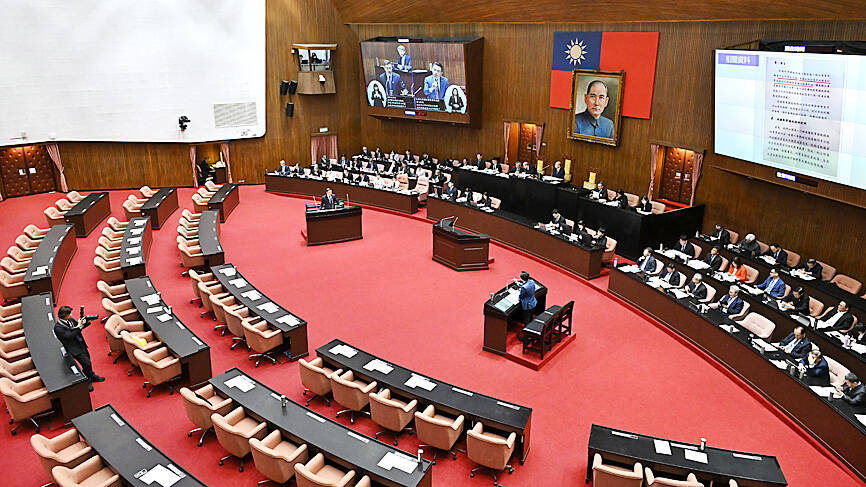The Legislative Yuan’s Internal Administration Committee is to review a proposed amendment to the National Security Act (國家安全法) on Thursday, a source said on Sunday.
Key points of the amendment include increasing penalties for working with hostile foreign organizations, expanding the scope of protected confidential information and establishing an evaluation mechanism and restriction list for information security products.
The goal is to complete the initial review of the amendment during this legislative session, the source said.

Photo: Chen Yi-kuan, Taipei Times
Following President William Lai’s (賴清德) instructions to propose strategies to respond to a recent rise in Chinese espionage activities, several Democratic Progressive Party (DPP) lawmakers have submitted proposals for legislative amendments, with nine different versions of amendments to the act filed over the past few days.
Among them, a proposal from DPP Legislator Chen Kuan-ting (陳冠廷) calls for expanding the definition of protected confidential information from covering only “official matters” to also include areas “related to national security or public interest.”
The proposal also calls for the establishment of a regular evaluation mechanism for cybersecurity products, and the publication of a list of restricted products.
If passed, the sale of mobile apps included on the restricted list would be punishable by fines ranging from NT$3 million to NT$30 million (US$92,407 to US$924,072).
DPP Legislator Wang Ting-yu (王定宇) proposed that those found to be working with hostile foreign organizations be subject to a maximum prison sentence of more than seven years and fines up to NT$100 million.
Wang’s proposal also stipulates that those found to have leaked or handed over confidential official documents resulting in harm to national security interests would face five to 12 years imprisonment.
Active military personnel and civil servants who exploit their positions to assist hostile foreign forces would see their sentence increased by 50 percent.
DPP Legislator Puma Shen (沈伯洋) separately proposed that military personnel, public sector employees and workers at state-owned enterprises convicted of national security-related crimes and sentenced to fixed-term imprisonment have their pensions suspended even before the verdict becomes final.
DPP caucus whip Rosalia Wu (吳思瑤) said in an interview on Sunday that other legislation beyond the National Security Act is also under review and could be amended.
Given the seriousness of the rise in Chinese espionage activities, the DPP caucus is considering every legislative session to be a “national security session,” she said.
Any bills not being blocked by opposition parties would be advanced as quickly as possible, she added.
There are a large number of proposed amendments to the National Security Act, so the DPP hopes to organize and refine the bills’ content through the question-and-answer process and by seeking input from administrative agencies, she said.
Internal Administration Committee convener Chang Hung-lu (張宏陸) said that some proposals still need to be consolidated and reviewed.
Although opposition parties have called for extending the legislative session to the end of July, there should be sufficient time within this session to pass an amendment to the National Security Act, he said.

The Coast Guard Administration (CGA) yesterday said it had deployed patrol vessels to expel a China Coast Guard ship and a Chinese fishing boat near Pratas Island (Dongsha Island, 東沙群島) in the South China Sea. The China Coast Guard vessel was 28 nautical miles (52km) northeast of Pratas at 6:15am on Thursday, approaching the island’s restricted waters, which extend 24 nautical miles from its shoreline, the CGA’s Dongsha-Nansha Branch said in a statement. The Tainan, a 2,000-tonne cutter, was deployed by the CGA to shadow the Chinese ship, which left the area at 2:39pm on Friday, the statement said. At 6:31pm on Friday,

The Chinese People’s Liberation Army Navy’s (PLAN) third aircraft carrier, the Fujian, would pose a steep challenge to Taiwan’s ability to defend itself against a full-scale invasion, a defense expert said yesterday. Institute of National Defense and Security Research analyst Chieh Chung (揭仲) made the comment hours after the PLAN confirmed the carrier recently passed through the Taiwan Strait to conduct “scientific research tests and training missions” in the South China Sea. China has two carriers in operation — the Liaoning and the Shandong — with the Fujian undergoing sea trials. Although the PLAN needs time to train the Fujian’s air wing and

The American Institute in Taiwan (AIT) put Taiwan in danger, Ma Ying-jeou Foundation director Hsiao Hsu-tsen (蕭旭岑) said yesterday, hours after the de facto US embassy said that Beijing had misinterpreted World War II-era documents to isolate Taiwan. The AIT’s comments harmed the Republic of China’s (ROC) national interests and contradicted a part of the “six assurances” stipulating that the US would not change its official position on Taiwan’s sovereignty, Hsiao said. The “six assurances,” which were given by then-US president Ronald Reagan to Taiwan in 1982, say that Washington would not set a date for ending arm sales to Taiwan, consult

A Taiwanese academic yesterday said that Chinese Ambassador to Denmark Wang Xuefeng (王雪峰) disrespected Denmark and Japan when he earlier this year allegedly asked Japan’s embassy to make Taiwan’s representatives leave an event in Copenhagen. The Danish-language Berlingske on Sunday reported the incident in an article with the headline “The emperor’s birthday ended in drama in Copenhagen: More conflict may be on the way between Denmark and China.” It said that on Feb. 26, the Japanese embassy in Denmark held an event for Japanese Emperor Naruhito’s birthday, with about 200 guests in attendance, including representatives from Taiwan. After addressing the Japanese hosts, Wang